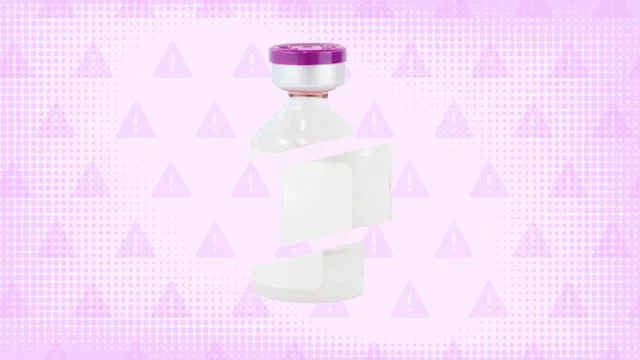Key takeaways:
High blood pressure is usually caused by a combination of genetic factors and lifestyle habits. But sometimes, medications can cause high blood pressure.
Nonsteroidal anti-inflammatory drugs (NSAIDs), some antidepressants, and some birth control pills can all raise your blood pressure. Steroids, decongestants, and stimulant medications can also cause high blood pressure.
If your medication is causing high blood pressure, talk to your healthcare provider about how best to manage this.
Save on related medications
Nearly 50% of U.S. adults have hypertension (high blood pressure). It’s usually caused by genetic factors and lifestyle habits. These can include things like family history of hypertension, smoking, and being of older age. But other medical conditions (like kidney disease) or medications can cause it, as well.
It's important to know if any of your medications have the potential to raise your blood pressure. Talk to your healthcare team about all the medications you take to see if any of them have this risk. Below, we’ll discuss nine medications that can raise your blood pressure.
1. NSAIDs like ibuprofen
Nonsteroidal anti-inflammatory drugs (NSAIDs) are used to relieve fever, pain, and inflammation. They come as over-the-counter (OTC) and prescription medications.
Search and compare options
NSAIDs can raise your blood pressure. One way they do this is by causing the body to hold onto salt and water. Examples of NSAIDs include:
Ibuprofen (Advil, Motrin): May be the most likely NSAID to raise blood pressure
Naproxen (Aleve, Naprosyn): May have a smaller impact on blood pressure
Diclofenac (Cambia): May have a smaller impact on blood pressure
Celecoxib (Celebrex, Elyxyb) is also an NSAID, but it works a little differently from those discussed above. Because of that, Celebrex likely doesn’t raise blood pressure as much as other NSAIDs, like ibuprofen. But keep in mind that Celebrex may raise the risk of heart attack and stroke for some people. So it may not be the best alternative for everyone.
Keep in mind that NSAIDs are part of many OTC products, even ones you might not expect. This includes cough and cold products like Advil Cold and Sinus (ibuprofen / pseudoephedrine) and sleep aids like Advil PM (ibuprofen / diphenhydramine). If you have hypertension, your healthcare provider may want you to avoid NSAIDs. Even slight increases in blood pressure can raise your risk of heart disease and stroke.
2. Tylenol
Tylenol (acetaminophen) is an OTC medication commonly used to treat pain and fever. Research on whether Tylenol increases blood pressure is mixed. Some studies show that Tylenol raises blood pressure while others don’t. It isn’t completely clear how Tylenol raises blood pressure. But researchers think it’s a result of Tylenol blocking an enzyme (protein) called cyclooxygenase (COX).
One 2022 study of over 100 people found that taking 4,000 mg of Tylenol per day every day for 2 weeks or longer raised blood pressure. This dose is the maximum recommended daily dose of Tylenol for most people.
If you already have high blood pressure, talk to your healthcare team about whether you need to avoid Tylenol. They may tell you that taking it occasionally is OK. But they might ask you to avoid taking Tylenol regularly.
3. Antidepressants, such as Wellbutrin
A number of antidepressants can raise your blood pressure. These include Wellbutrin (bupropion) and serotonin and norepinephrine reuptake inhibitors (SNRIs), such as Cymbalta (duloxetine).
Their impact on blood pressure may be due to their effects on a brain chemical called norepinephrine. Norepinephrine constricts (tightens) blood vessels, which can increase blood pressure. Keep in mind, high blood pressure isn't common with antidepressants. But if you already have hypertension, you may have a greater risk of this side effect.
Your healthcare team will likely monitor your blood pressure more closely during treatment with these medications. If you have hypertension, they may recommend another antidepressant. For example, selective serotonin reuptake inhibitors (SSRIs), such as Lexapro (escitalopram), are less likely than Wellbutin and SNRIs to increase blood pressure.
4. Stimulant ADHD medications
Stimulants are a common treatment for attention-deficit hyperactivity disorder (ADHD). They work by raising levels of the chemicals norepinephrine and dopamine in the brain. But this may also raise blood pressure.
Commonly prescribed stimulant ADHD medications include:
Adderall and Adderall XR (amphetamine salt combo)
Vyvanse (lisdexamfetamine)
Ritalin (methylphenidate)
Concerta (methylphenidate ER)
Focalin (dexmethylphenidate)
If you have hypertension, coronary artery disease, or other heart problems (like a previous heart attack or stroke), talk to your healthcare team. Stimulants may be riskier if you have one of these medical conditions.
Good to know: Strattera (atomoxetine) is a non-stimulant ADHD medication. But even though it’s not a stimulant, it can also raise blood pressure.
5. Birth control pills with estrogen
Some people who take birth control pills with estrogen have been shown to develop high blood pressure. The vaginal ring has also been found to raise blood pressure in some people. This side effect is less common with modern birth control methods, which contain lower levels of estrogen, but it’s still possible.
Estrogen may increase blood pressure by raising levels of a protein called angiotensinogen. Angiotensinogen eventually turns into angiotensin II, which can raise blood pressure.
In most cases, birth control doesn’t raise blood pressure by a significant amount. But if you already have hypertension, your healthcare team may recommend a progestin-only birth control pill. They may also recommend an alternative method of birth control, like the arm implant or an intrauterine device (IUD).
6. Steroids
Corticosteroids (commonly referred to as “steroids”) are taken to lower inflammation in the body. Examples include prednisone and methylprednisolone (Medrol). They’re prescribed for many different conditions, including autoimmune conditions like rheumatoid arthritis.
Long-term use of steroids can raise your risk of developing high blood pressure. This is likely because they cause the body to hold onto salt and water. But steroids also interfere with your body’s metabolism and can cause weight gain, which can contribute to high blood pressure. Taking higher doses may carry a greater risk of increased blood pressure.
If you take steroids for a longer period of time, your healthcare team might ask you to check your blood pressure at home. If your blood pressure goes up and stays high, they may suggest alternatives to the steroid you’re taking. But stopping a steroid isn’t always an option. In some cases, you may need to take a blood pressure-lowering medication to help bring your blood pressure back to a healthy range.
Good to know: Nasal steroid sprays, such as Flonase (fluticasone propionate), are unlikely to cause body-wide side effects, such as high blood pressure. But to be safe, you should speak with your healthcare team before using them.
7. Decongestants
Oral decongestants, like Sudafed (pseudoephedrine), can help relieve a stuffy nose. They work by constricting the blood vessels in your nose to reduce swelling. But constricting blood vessels in other parts of the body can lead to high blood pressure. They can also raise your heart rate.
If you have hypertension, your healthcare team may suggest an alternative medication for your stuffy nose.
Note: Decongestant nasal sprays, such as Afrin (oxymetazoline), are less likely than oral decongestants to raise your blood pressure. But they’re still not recommended if you have existing hypertension.
8. Immunosuppressants
Immunosuppressants are medications that suppress (weaken) your immune system. They’re commonly prescribed to prevent your body from rejecting an organ transplant or to treat a flare-up of an autoimmune condition.
But some immunosuppressants may increase blood pressure. Cyclosporine (Sandimmune, Gengraf, Neoral) and sirolimus (Rapamune) are two examples. One way these medications may raise blood pressure is by constricting your blood vessels and making your kidneys hold onto salt.
If you’re taking immunosuppressants, your healthcare team will likely monitor your blood pressure. If your blood pressure is high, they’ll help you decide what to do next. Don’t stop these medications without talking to your healthcare team first. Stopping them abruptly can be dangerous.
9. Biologics, such as Humira
Biologics are medications that are made from natural sources, like sugars or proteins. They’re prescribed for various conditions, including autoimmune conditions. But hypertension is a possible side effect of some biologics, including Humira (adalimumab) and Remicade (infliximab).
If you’re taking a biologic, your healthcare team should monitor your blood pressure before and during treatment. If you develop high blood pressure, they’ll help you decide how to manage it.
Which medications and supplements should you avoid if you have high blood pressure?
The medications listed above aren’t the only ones that could raise your blood pressure. And OTC supplements can also impact your blood pressure.
Other medications and supplements that could raise your blood pressure include:
Monoamine oxidase inhibitors (MAOIs), such as selegiline (Emsam Zelapar)
Angiogenesis inhibitors (a type of cancer treatment), such as Avastin (bevacizumab)
Janus kinase (JAK) inhibitors, such as Xeljanz (tofacitinib)
Medications that contain caffeine, such as Excedrin (acetaminophen / aspirin / caffeine)
Licorice root, or eating large amounts of black licorice candy
Guarana, a supplement that’s commonly included in energy drinks
Ma huang (also called ephedra)
Cannabis products that contain THC (tetrahydrocannabinol)
This isn’t a comprehensive list of all medications and supplements that can raise blood pressure. Your pharmacist is a great resource to help determine if high blood pressure is a possible side effect of your medications.
What else can raise blood pressure?
As mentioned earlier, hypertension is often caused by a combination of factors. Here’s some other things that can contribute to a rise in blood pressure:
Smoking
Drinking alcohol, especially consuming it regularly or in high amounts
Excessive caffeine (although consuming lower amounts may actually be heart protective)
Drinking energy drinks
Leading an inactive lifestyle
Eating too much sodium (salt)
Eating ultra-processed foods or foods high in saturated fats or added sugars
Having a heavier body weight
Having certain health conditions, such as diabetes
The bottom line
Many medications can increase your blood pressure. This includes nonsteroidal anti-inflammatory drugs (NSAIDs), such as ibuprofen (Advil, Motrin), and some antidepressants, such as Wellbutrin (bupropion). Stimulant medications, steroids, and birth control methods containing estrogen can also raise your blood pressure.
If you suspect that your medication is causing high blood pressure, talk with your healthcare team. They can help you decide whether you need to make lifestyle changes, lower your dose, or stop the medication altogether.

Why trust our experts?


References
American Heart Association. (2022). People with very high blood pressure may want to go easy on the coffee.
American Heart Association. (2023). Understanding over-the-counter (OTC) medications and high blood pressure.
Bancos, I. (2022). Adrenal Hormones. Endocrine Society.
Benigni, A., et al. (2010). Angiotensin II revisited: New roles in inflammation, immunology and aging. EMBO Molecular Medicine.
Cagnacci, A., et al. (2013). Modification of 24-h ambulatory blood pressure and heart rate during contraception with the vaginal ring: A prospective study. Contraception.
Calvi, A., et al. (2021). Antidepressant drugs effects on blood pressure. Frontiers in Cardiovascular Medicine.
Centers for Disease Control and Prevention. (2021). Facts about hypertension.
Deutch, M. R., et al. (2019). Bioactive candy: Effects of licorice on the cardiovascular system. Foods.
Grossman, A., et al. (2015). Drug induced hypertension — An unappreciated cause of secondary hypertension. European Journal of Pharmacology.
Laban, T. S. (2023). Monoamine oxidase inhibitors (MAOI). StatPearls.
LiverTox. (2023). Guarana. National Library of Medicine.
MacIntyre, I. M., et al. (2022). Regular acetaminophen use and blood pressure in people with hypertension: The PATH-BP trial. Circulation.
Mebrahtu, T. F., et al. (2020). Oral glucocorticoids and incidence of hypertension in people with chronic inflammatory diseases: A population-based cohort study. Canadian Medical Association Journal.
Memorial Sloan Kettering Cancer Center. (2023). Ephedra.
O’Donnell, E., et al. (2014). Estrogen status and the renin angiotensin aldosterone system. Regulatory, Integrative and Comparative Physiology.
Opalka, B., et al. (2023). Immunosuppressive agents—effects on the cardiovascular system and selected metabolic aspects: A review. Journal of Clinical Medicine.
Ruschitzka, F., et al. (2017). Differential blood pressure effects of ibuprofen, naproxen, and celecoxib in patients with arthritis: the PRECISION-ABPM (prospective randomized evaluation of celecoxib integrated safety versus ibuprofen or naproxen ambulatory blood pressure measurement) trial. European Heart Journal.
Sastre, J., et al. (2012). Local and systemic safety of intranasal corticosteroids. Journal of Investigative Allergology and Clinical Immunology.
Sherve, K., et al. (2014). Cardiovascular effects of NSAIDs. American Family Physician.
Shufelt, C., et al. (2021). Hormonal contraception in women with hypertension. JAMA.
Sica, D. A. (2007). Angiogenesis inhibitors and hypertension. US Cardiology Review.
Turtle, E. J., et al. (2012). A systematic review of the effect of paracetamol on blood pressure in hypertensive and non-hypertensive subjects. British Journal of Clinical Pharmacology.
Unger, T., et al. (2020). 2020 International Society of Hypertension global hypertension practice guidelines. Hypertension.
U.S. Food and Drug Administration. (2018). FDA drug safety communication: Safety review update of medications used to treat attention-deficit/hyperactivity disorder (ADHD) in children and young adults.
Zhao, Q., et al. (2015). Association between anti-TNF therapy for rheumatoid arthritis and hypertension. Medicine.
Zhong, Z., et al. (2017). A meta-analysis of effects of selective serotonin reuptake inhibitors on blood pressure in depression treatment: Outcomes from placebo and serotonin and noradrenaline reuptake inhibitor controlled trials. Neuropsychiatric Disease and Treatment.
Zorn, S. Z. (2015). The safety of stimulant medication use in cardiovascular and arrhythmia patients. American College of Cardiology.














